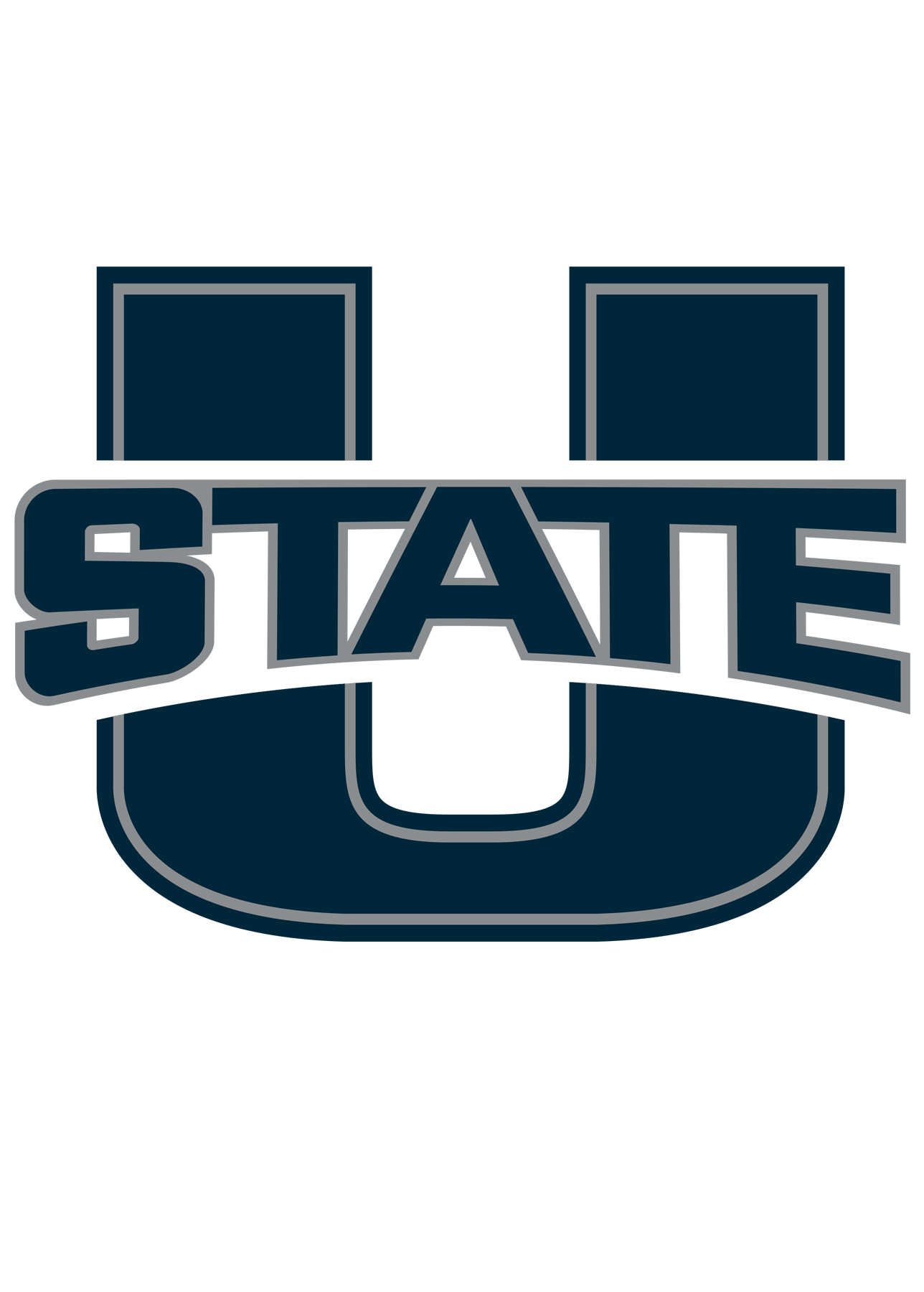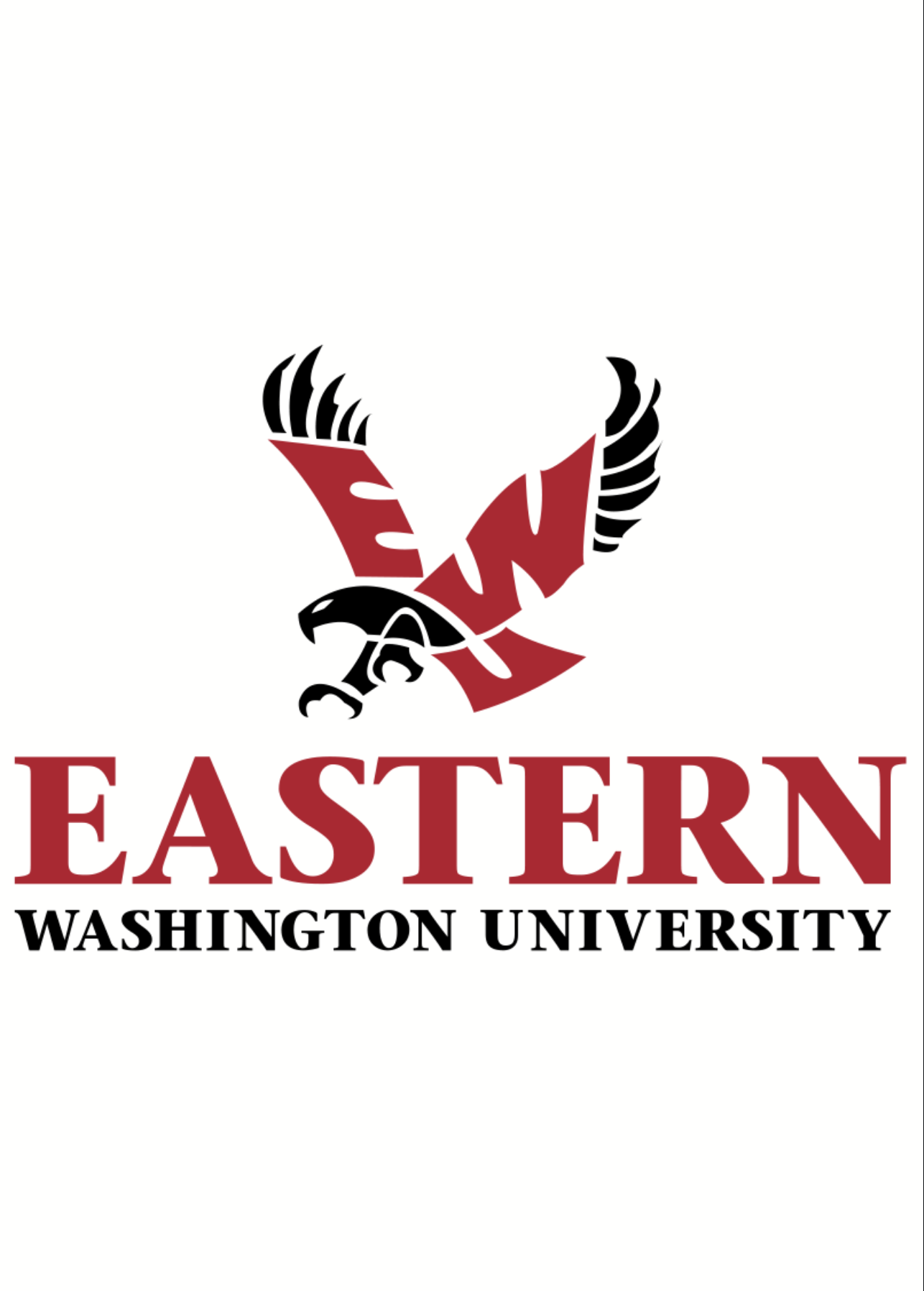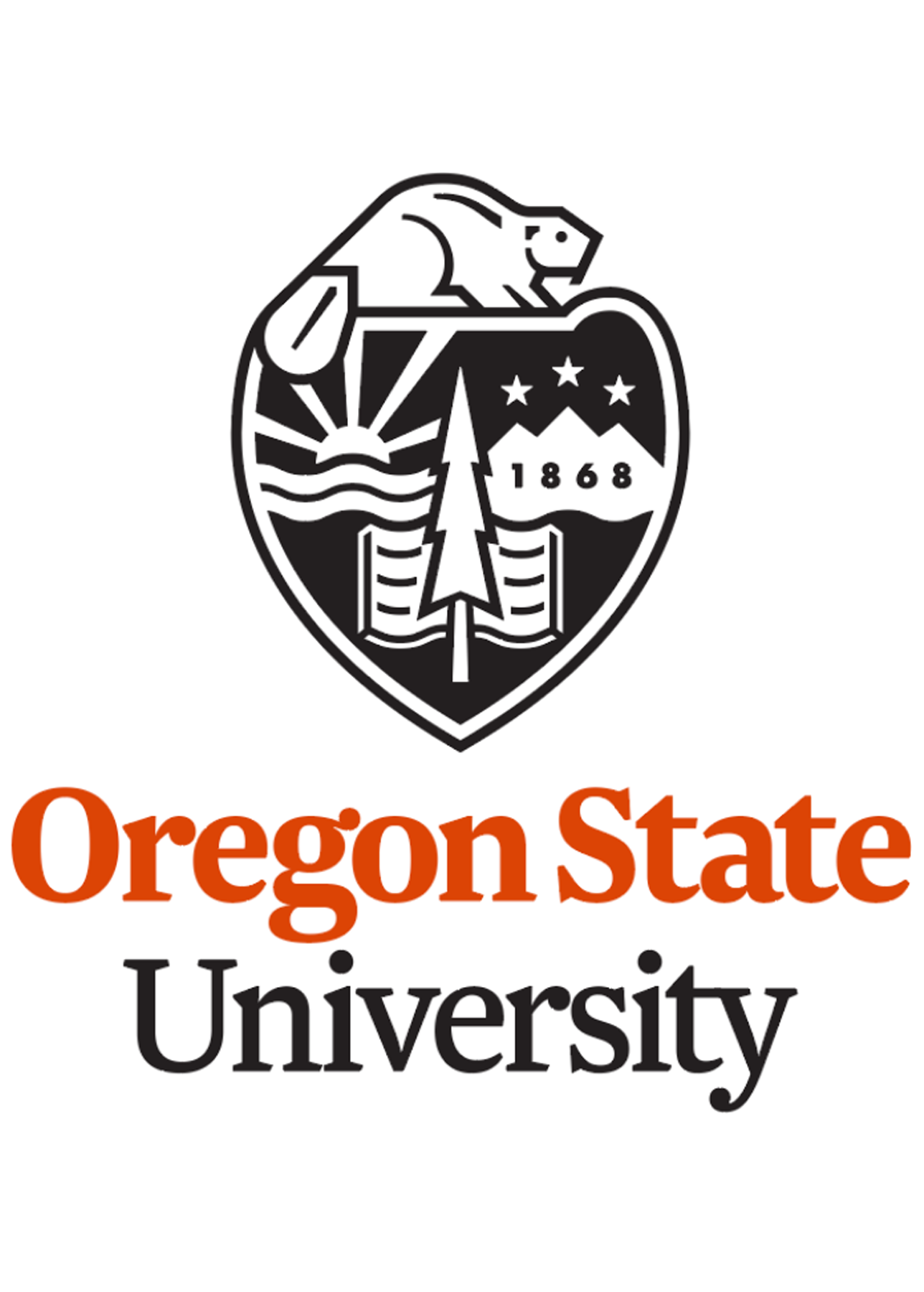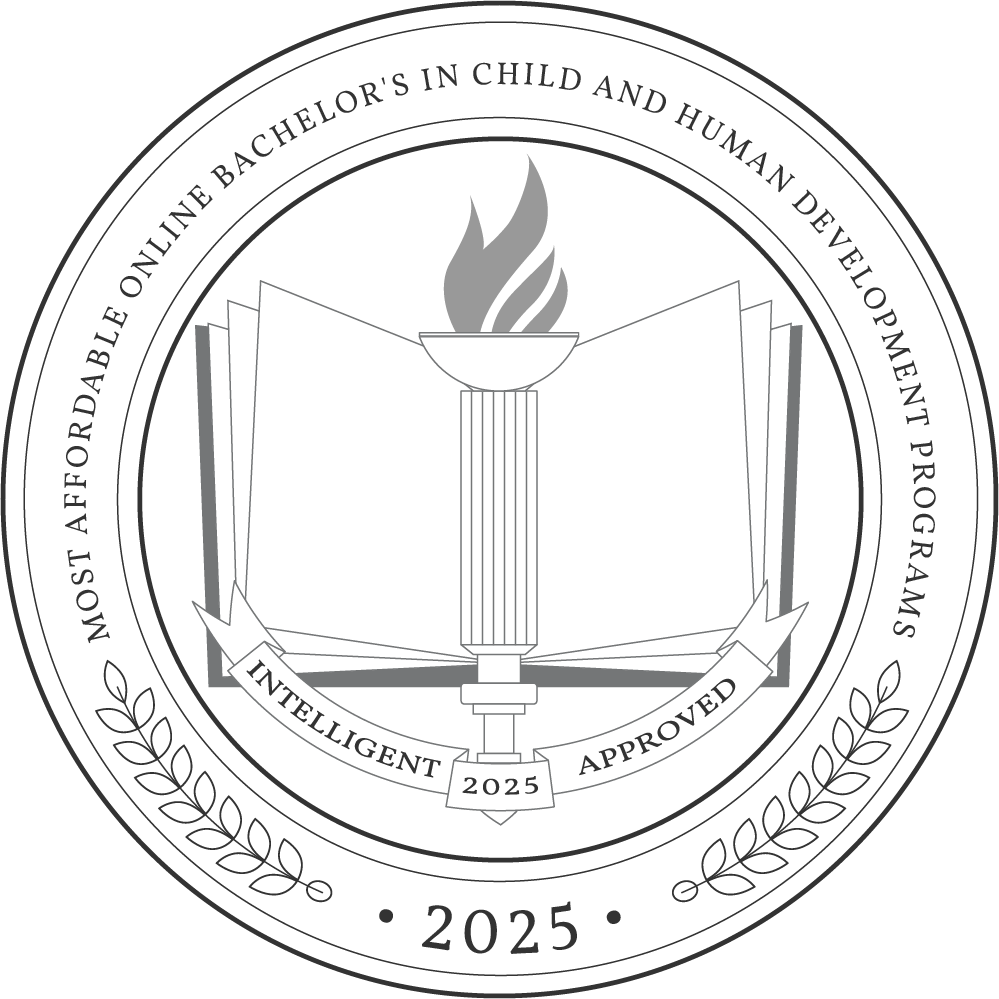With an online bachelor’s in child and human development, students gain an understanding of how individuals develop psychologically, biologically, and socially throughout their lives, leading to careers in education, social services, research, advocacy, and more.
One of the many factors that students must consider when selecting an online bachelor’s degree program in child and human development is cost. According to the National Center for Education Statistics (NCES), the average annual tuition for a four-year degree program in the 2022-23 academic year was $9,750 at public universities and $38,412 at private institutions. However, tuition can vary widely by school, so Intelligent.com compiled this list of the most affordable online bachelor’s in child and human development programs.
This article also includes guidance from Dana Marvin, an independent college admissions counselor, on choosing and paying for the affordable online bachelor’s in child and human development program that’s right for you.
Cost Breakdown for an Online Bachelor’s in Child and Human Development Program
Understanding what costs factor into an online bachelor’s degree in child and human development can help students set a realistic budget.
- Tuition: Tuition is the primary cost of earning any degree. For undergraduate programs, full-time students typically pay a flat, per-term tuition rate, while part-time students are charged based on the number of credit hours they take each term. Tuition rates vary by school based on several factors. Students should consult with a school’s financial aid office representative for the most accurate information about a program’s tuition rate.
- Fees: Schools often charge additional fees for expenses not covered by tuition. For example, online programs often charge students fees for virtual classroom technology, digital resources, and technical support. Additionally, child and human development program students may need a background check to fulfill internship requirements. Fees may be assessed on a one-time, per-year, or per-term basis. Students should speak to a financial aid counselor for specific information on fees.
- Personal technology: Reliable hardware and internet access are essential for success in online degree programs. Before starting your program, assess your technology set-up and determine if you need to upgrade your computer, webcam, microphone, or internet service to ensure everything works smoothly. Check with your school to find out if they partner with retailers or companies to offer discounts on essential tech supplies.
- Books and supplies: According to the Education Data Initiative, the average postsecondary student spent between $628 and $1,200 for books and supplies during the 2021-2022 academic year. Therefore, it’s essential to budget for this expense as well. Also, consider if your program requires an internship, which may mean additional costs for business attire or transportation to your internship site.
Factors Influencing the Cost of an Online Bachelor’s in Child and Human Development Program
Tuition at individual schools varies based on the factors outlined below:
Public vs. private institution
An institution’s public or private college status significantly impacts its tuition rates. Public institutions receive state and federal government funding to help subsidize costs for state residents, which is why most public colleges charge in-state and out-of-state tuition. However, as online education has increased in popularity, more schools charge all students the same tuition rates, regardless of where they live. Meanwhile, private schools don’t receive government funding and instead use tuition as their primary source of revenue. Private schools often charge more than public colleges, and tuition rates are the same for all students, regardless of residency.
Nonprofit vs. for-profit
Another college classification that impacts tuition rates is non-profit and for-profit. All public and most private universities are non-profit, which means they must reinvest revenue into the institution through faculty and staff salaries, infrastructure, student services, and more. For-profit schools operate like corporations, with the primary goal of earning a profit. Tuition rates may be lower, but because for-profit schools typically invest less in faculty, infrastructure, and other student resources, students at for-profit schools may receive a different quality of education than those at non-profits. Students considering for-profit schools should carefully review how the institution invests its money and its student outcomes.
Student military status
It’s common practice for colleges to offer discounted tuition rates to active-duty military service members, veterans, and spouses or children of service members. If you fit into one of these categories, inquire about tuition discounts with your school’s financial aid office.
Why Trust Us
The Intelligent.com Higher Education Team is dedicated to providing students with independent, equitable school and program rankings and well-researched resources. Our expert-driven articles cover topics related to online colleges and programs, paying for school, and career outlooks. We use data from the U.S. Department of Education’s College Scorecard, the National Center for Education Statistics, and other reputable educational and professional organizations. Our academic advisory team reviews content and verifies accuracy throughout the year for the most current information. Partnerships do not influence rankings or editorial decisions.
- Analyzed over 2,000 national, accredited, and nonprofit colleges and universities
- 800+ rankings pages are reviewed and updated yearly
- Content is informed by reputable sources, surveys, and interviews with academic advisors and other experts
- Over 100 data points are reviewed for accuracy and quality throughout the year, including sources
How we rank schools
Our list features the best online Child and Human Development degree programs at top colleges nationwide. Each school featured is a nonprofit, accredited institution — either public or private — with a high standard of academic quality for post-secondary institutions.
We evaluated each school’s program on tuition costs, admission, retention and graduation rates, faculty, reputation, and the student resources provided for online students. We collected data from trusted sources like the National Center for Education Statistics, individual school and program websites, school admissions counselors, and other data sources. Then, we calculated the Intelligent Score on a scale of 0 to 100 based on the following criterion:
Academic Quality:
- Admission rate versus enrollment rate
- Retention rate of students who return after year one
- Accreditation status (regional and programmatic)
- Nonprofit status, both private and public institutions
Graduation Rate
- Overall graduation rate
- Total number of currently enrolled students, including diversity metrics
- Student-to-faculty ratio
Cost and ROI
- In-state and out-of-state per-credit tuition rates and fees
- Required credits to graduate
- Earning potential after graduation
- Availability of federal student loans, scholarships, and other financial aid options
Student Resources
- Available student services for online-only and hybrid programs
- On-campus amenities like tutoring centers and the number of libraries
Read more about our ranking methodology.
Best 9 Affordable Online Bachelor's in Child and Human Development Programs
FiltersInstitution Type
Status
- Intelligent Score
- Alphabetically By University Name
- Acceptance Rate
- Enrollment
- In-state Graduate Tuition
- Out-of-state Graduate Tuition
- In-state Undergraduate Tuition
- Out-of-state Undergraduate Tuition

Appalachian State University
Intelligent Score: 99.55In-state: $4,242
Out-of-state: $19,049
In-state: $4,839
Out-of-state: $4,839
SAT: 1070-1240
ACT: 22-27
Resident: $176
Non-Resident: $884
Online
Southern Association of Colleges and Schools Commission on Colleges
120

Colorado State University
Intelligent Score: 98.07In-state: $9,426
Out-of-state: $28,147
In-state: $10,520
Out-of-state: $10,520
SAT: 1070-1280
ACT: 23-29
$476
Online
Higher Learning Commission
120

Utah State University
Intelligent Score: 96.57In-state: $6,732
Out-of-state: $21,677
In-state: $6,164
Out-of-state: $6,164
SAT: 1080-1320
ACT: 21-29
$382
Online
Northwest Commission on Colleges and Universities
120

Washington State University
Intelligent Score: 95.96In-state: $10,202
Out-of-state: $25,145
In-state: $11,781
Out-of-state: $11,781
SAT: 1020-1210
ACT: 20-26
$567
Online
Northwest Commission on Colleges and Universities
120

Eastern Washington University
Intelligent Score: 94.76In-state: $6,707
Out-of-state: $24,676
In-state: $12,015
Out-of-state: $12,015
SAT: 880-1090
ACT: 16-23
Resident: $364
Non-Resident: $1,241
Online
Northwest Commission on Colleges and Universities
180

Oregon State University
Intelligent Score: 93.95In-state: $9,846
Out-of-state: $29,445
In-state: $13,257
Out-of-state: $13,257
SAT: 1080-1310
ACT: 21-29
$350
Online
Council on Education for Public Health
180

University of Texas of the Permian Basin
Intelligent Score: 93.21In-state: $11,448
Out-of-state: $40,032
In-state: $12,028
Out-of-state: $12,028
SAT: 1210-1470
ACT: 26-33
$219
Online
Southern Association of Colleges and Schools Commission on Colleges
120

University of Massachusetts Amherst
Intelligent Score: 92.65In-state: $15,791
Out-of-state: $35,779
In-state: $14,014
Out-of-state: $14,014
SAT: 1200-1390
ACT: 27-32
$450
Online
New England Commission of Higher Education
120

Kansas State University
Intelligent Score: 92.16In-state: $9,375
Out-of-state: $25,251
In-state: $10,212
Out-of-state: $10,212
SAT: N/A
ACT: N/A
$468
Online
Higher Learning Commission
120
How to Pay for an Online Bachelor’s in Child and Human Development
Students have many options when it comes to paying for an online bachelor’s in child and human development:
Scholarships and grants
“Scholarships and grants are two of the key avenues students and families should explore for college funding, as they can either lower or completely cover the cost of a degree,” Marvin says. This type of funding is considered gift aid because it does not have to be repaid. Several sources for scholarships and grants include individual colleges, federal and state governments, professional organizations, private foundations, community and religious groups, and non-profits. Grants are typically awarded based on financial need, but students can receive scholarships for their academic, athletic, or extracurricular achievements, being part of a specific demographic, or their financial need. For need-based scholarships, students must typically submit the Free Application for Federal Student Aid (FAFSA).
Employer tuition assistance
Students who work while earning their online bachelor’s in child and human development degree should inquire with their employer about tuition assistance benefits. Specific rules vary by company, but in most cases, employers reimburse students for some or all of the cost of successfully completed courses.
Work-study
Another option is applying for work-study funding through the Federal Student Aid (FSA) program. As part of their financial aid package, students receive money in exchange for working part-time for their college. Work-study positions exist in various college departments, and online students should inquire about available remote work-study positions. Work-study jobs pay at least the federal minimum wage, although many pay more.
Federal student loans
The U.S. government also offers federal student loans through the FSA program. For undergraduate students, loan options include Direct Subsidized Loans and Direct PLUS Loans. “With federal student loans, qualification doesn’t depend on credit score; there are income-driven repayment plans, and depending on the future career of the student, there are loan forgiveness programs, like Public Service Loan Forgiveness,” Marvin says. Students must submit the Free Application for Federal Aid (FAFSA) to determine their eligibility for federal student loans.
Marvin says when borrowing money for education, “Borrow only what you need and nothing more. For example, if you’re eligible for a $12,500 loan but only need $8,000, there’s no need to borrow the full amount. Remember, every dollar you take out in a loan must be paid back with interest. You can also begin paying off your loans as soon as they’ve been taken out. Even paying off a few hundred or thousand dollars before finishing school can greatly affect your post-graduation loan amounts.”
Private education loans
Students who need additional funds to cover their educational costs may also consider private loans from lenders like SoFi, Sallie Mae, and Ascent. Private education loans differ from federal student loans because their interest rates and repayment terms are based on current market rates and the borrower’s credit history. Therefore, they may be less favorable than terms for federal student loans. “If you’re taking out money in private loans, shopping around for the best rate is necessary,” Marvin says. “Keep an eye on sites like NerdWallet to see which companies have the best interest rates and repayment terms, and remember that this can fluctuate based on multiple factors.”
Out-of-pocket
When students or families use their own money to pay for tuition and other education-related expenses, it’s considered paying out of pocket. Most students pay at least some education expenses out of pocket. If you plan on paying some or all of your tuition out-of-pocket, inquire with the school’s financial aid office to determine if they allow students to pay in installments throughout the term.
Scholarship Database
Intelligent Scholarship Finder Tool
"A Helping Hand" Scholarship
Award Amount: $500
Due Date: January 31, 2025
"Follow Your Own Path" Essay Scholarship
Award Amount: $500
Due Date: January 31, 2025
"Tuition Solution" Scholarship for STEM Students
Award Amount: $500
Due Date: January 31, 2025
$25k "Be Bold" No-Essay Scholarship
Award Amount: $25,000
Due Date: Closed for 2024
(ISC) Graduate Cybersecurity Scholarship
Award Amount: $5,000
Due Date: Closed for 2024
(ISC) Women in Information Security Scholarship
Award Amount: $5,000
Due Date: Closed for 2024
A.C. "Kate" & Leo Joseph Merlone St. Dominic Catholic Church of Saginaw Member Scholarship
Award Amount: Varies
Due Date: Closed for 2024
A.C. "Kate" & Leo Joseph Merlone Teaching Scholarship
Award Amount: Varies
Due Date: Closed for 2024
a/e ProNet David W. Lakamp Scholarship
Award Amount: $5,000
Due Date: Closed for 2024
AAAE Native American Scholarship
Award Amount: $1,500
Due Date: March 15, 2025
What Can You Do With an Online Bachelor’s in Child and Human Development Degree?
An online bachelor’s in child and human development can prepare students for various career and educational paths working with children, adolescents, and families. Individuals with this degree may go on to work in daycares, schools, social services agencies, community youth programs, healthcare settings, and more.
Depending on your state’s credentialing requirements, a bachelor’s degree may be sufficient to obtain certification for teaching in a preschool or elementary setting. It also provides an ideal stepping-stone to further education in social work, counseling, psychology, and education.
Career Outlook
- Preschool teachers — Educate and care for children younger than five who have not yet entered kindergarten by teaching primary language, motor, and social skills.
-
- Median annual salary: $37,130
- Projected employment growth (through 2032): 3%
- New jobs projected: 56,300 per year
- Preschool and childcare center directors — Supervise and lead staff, design program plans, oversee daily activities, prepare budgets, and direct before- and after-school care for childcare centers.
- Median annual salary: $54,290
- Projected employment growth (through 2032): -3%
- New jobs projected: 4,600 per year
- Teaching assistants — Work with licensed teachers to give students additional attention and instruction by reviewing material with students, assisting with record-keeping, and supervising students between classes, during lunch and recess, and on field trips.
- Median annual salary: $35,550
- Project employment growth (through 2032): 0%
- New jobs projected: 151,000 per year
How to Choose the Online Child and Human Development Degree Program that’s Right for You
Step 1: Clarify what your goals and priorities
Prioritizing affordability is an integral part of determining what you want in an online bachelor’s in child and human development, but there are several other factors to consider. Before you begin an in-depth search for programs, reflect on your career goals, professional interests, and other personal needs to help you set parameters for suitable programs.
Are you interested in pursuing a particular area of concentration within child and human development, such as social and emotional growth in children, individual and family development, infants and toddlers, or gerontology and aging? Are you seeking a program to prepare you for teaching certification or research-based roles?
Establishing your logistical needs is also helpful at this stage. For the most flexibility, consider asynchronous programs that allow students to complete lessons and assignments independently. Students who prefer learning through real-time interaction may prefer synchronous programs that feature regularly scheduled virtual classes.
Step 2: Research schools and programs
The next step is researching schools and programs that align with your goals and needs.
When exploring your options, confirm that all schools you’re considering are accredited by a recognized accrediting agency. Accreditation guarantees that an institution and its programs meet high-quality standards, while a lack of accreditation can impact eligibility for financial aid, jobs, and future educational opportunities. Students can verify a school’s accreditation status through the Council for Higher Education Accreditation (CHEA) database.
Other questions to ask during the research process include:
- Who are the program’s faculty, and what are their credentials?
- Does the curriculum include hands-on learning experiences like internships?
- What support services does the school offer online students?
- What types of scholarships, grants, and fellowships are available?
Schools generally include this information on their website or with marketing materials available to potential students. They may also offer online open houses or information sessions where students can speak to faculty, students, and admissions counselors. Following schools, programs, and faculty on social media is another way to learn more about a program.
Step 3: Review application and eligibility requirements
Determining whether you are eligible for admission to an online bachelor’s in child and human development program is another key step in selecting the right program. While gathering information about schools, be sure to find out their application and eligibility requirements, as this will vary from school to school.
Typically, for bachelor’s degrees, students must submit the following:
- Completed application and required fees
- Official transcripts from high school and any previously attended colleges
- Letters of recommendation
- Personal essay
- Resume
- SAT or ACT scores.
Contact their admissions office if you have questions or need clarification about a school’s application processes or eligibility requirements.



